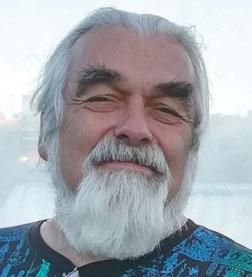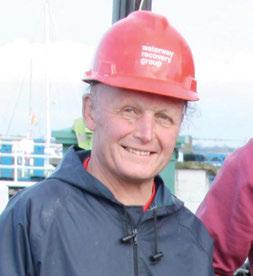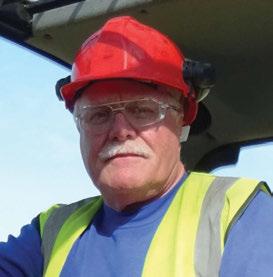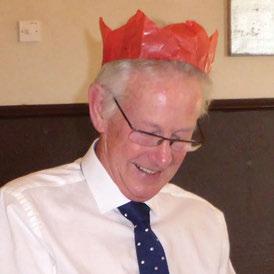
7 minute read
News
Waterways restoration in the new normal
Several IWA branches re-started vegetation clearance, canal clean-ups and other activities this summer to ensure our waterways look good for all of the extra visitors getting afloat and enjoying the towpath throughout the Covid-19 pandemic. Continuation of this type of work through the winter will depend on the impact of local lockdowns.
While no one could doubt the enthusiasm within the sector for getting back to work, there were concerns regarding the viability of doing so during the current climate. To get an initial picture of early post-lockdown canal restoration, we conducted a survey in August asking groups to report their experiences, concerns and issues.
Following the lifting of lockdown restrictions in July, work restarted across the restoration movement – but the sector had to adapt. With smaller numbers of volunteers and changes to working practices, such as no tool sharing, productivity has reduced as much as 50% from pre-lockdown figures. Groups have noted a drop in morale, with many older volunteers still cautious about returning. Welfare arrangements on site have also had to change, i.e. volunteers having to maintain a 2m distance during staggered tea breaks.
The picture is not all gloomy, however. Organisations have reported that the forced break in work gave them opportunity to step back and assess their projects – from spending more time in the pre-construction planning (permissions, surveys) through to arranging the delivery phase of their restoration. Projects have also benefited from increased public awareness at a local level with people discovering their canal for the first time and signing up to become members and volunteers.
The drop in fundraising events and grant opportunities has affected restoration groups but the pandemic has led to more creative approaches and the possibility of new sources of funding. Groups are also seeing more positive local authority support for their project, as post-Covid-19 regeneration efforts seek to revitalise green spaces.
It’s a mixed picture and going forward the volunteer sector will have to become increasingly versatile in order to adapt to the ever-changing situation. IWA’s Restoration Hub will be working closely with organisations within the sector to ensure we are all able to adapt and access opportunities on the horizon as Government funds to kickstart the economy come online, local ‘micro volunteering’ becomes more popular, and post-Brexit funding streams develop. The Hub can also assist with Covid-19 guidance and risk assessment templates to help groups plan and manage their return to volunteering.
The attraction of youth
Many organisations are wrestling with the need to attract new audiences who are willing to get active and involved, and the restoration sector tackled this issue head on at the recent Waterway Restoration Conference, jointly organised by IWA and Canal & River Trust.
Postponed from March, the event was held online for the first time and drew the largest audience in its history. Presentations included a session on governance, led by IWA’s interim chief executive Sarah O’Grady, a talk from ex-BBC journalist and liveaboard David Akinsanya about the importance of a diverse volunteer base, and a presentation on the power of heritage volunteering including how to attract and motivate these teams.
The focus of the conference went beyond simply encouraging new people to volunteer, and sought to inspire attendees to think about their succession planning and how to get younger people involved at senior levels.
The conference presentations are available to view on IWA’s YouTube channel alongside the full selection of waterway webinars, which have been running throughout the summer. The restoration conference seminar programme continues weekly into November and all are welcome to attend.
AWARD WINNERS ANNOUNCED AT VIRTUAL AGM
IWA’s annual Volunteer Awards were announced at the virtual AGM on Saturday 26th September, and introduced by Audrey Smith OBE, Chair of the Association’s Volunteer Awards panel.
CYRIL STYRING TROPHY – IWA’s premier award, given to an individual IWA member who has, in the opinion of the trustees, made an outstanding contribution to furthering the Association’s campaigns.
The trophy was awarded to John Pomfret, who joined IWA in 1969 before becoming involved in the Inland Shipping Group throughout the ’70s and ’80s. In 1992 he took over the role of chairman of IWA’s former Conservation Committee, and was elected to the Board of Trustees in 2000. He has served on Defra’s Inland Waterways Amenity Advisory Council (latterly IWAC), and authored a number of its publications, including Britain’s Inland Waterways: Balancing the needs of navigation and aquatic wildlife. John has been a member of IWA’s Navigation Committee providing expertise on environmental and inland shipping issues almost continuously for over 30 years. His understanding of VHF radio usage and potential problems arising between commercial and private boaters has been invaluable to the Association. Furthermore, John’s intimate knowledge of a very wide range of inland waterways, especially those less frequently travelled, has also been an important resource for the Association which he has shared through his creation of IWA’s Waterways Directory.

John Pomfret was honoured with IWA’s most prestigious award, the Cyril Styring Trophy.
JOHN HEAP SALVER – awarded to an IWA member who, in the opinion of the trustees, has made an outstanding contribution to raising funds for the Association.
John Brice was named as the recipient, having been involved with IWA Chiltern Branch for at least 25 years and raised over £50,000 in funds for projects including benches on the Grand Union Canal and a new slipway on the Wendover Arm. He organised annual lock-wind weekends, day trips and boat cruises as well as branch jumble sales at the Rickmansworth Festival.
CHRISTOPHER POWER PRIZE – awarded to a person, society or trust who has made the most significant contribution to the restoration of an inland waterway.
This went to Athina Beckett for her dedicated and enthusiastic contribution to the ongoing restoration of the Grand Union Canal’s Buckingham Branch. Athina joined Buckingham Canal Society in 1993 as a volunteer and in 1997 took on the job of work party leader, a role she continues to hold today. She has been particularly successful at encouraging corporate volunteering involvement with the restoration project. A cheque for £1,000 was presented to Buckingham Canal Society as part of the prize.
RICHARD BIRD MEDALS – received by volunteers nominated by their colleagues for the significant benefits they have brought to IWA over a sustained period.
• David Venn: David has been a member of IWA for the best part of 25 years and on retiring to East Anglia became chairman of IWA Peterborough Branch where he kept up pressure on the Environment Agency to retain navigation on the Old Bedford River, and led campaign cruises along Horseways Channel to Welches Dam.
• Robin Bishop: Robin is Secretary of IWA West London Branch, a role he has carried out for many years, and is well known across the waterways for his involvement with the Friends of Raymond, helping to take Raymond and Nutfield to waterways festivals. He is dedicated to improving the canals and can often be found at work parties.

IWA West London Branch Secretary, Robin Bishop, received a Richard Bird Medal.
Adrian Sturgess: Adrian began volunteering with Waterway Recovery Group in 2005 and is now one of their most highly skilled excavator operators. He has volunteered on over 70
Canal Camps, training weekends and other national events, as well as countless regional digs. A former unsung hero,
Adrian’s time spent teaching over 200 new plant operators has meant he is now one of WRG’s main ‘go to’ instructors.

Adrian Sturgess, WRG volunteer and Richard Bird Medal recipient.
• Jack Wootton: Jack joined IWA in 1979 and became treasurer of IWA East Yorkshire Branch committee in 1993, a role he held for 27 years. Jack also organised the branch’s annual outings, giving supporters the opportunity to visit other waterways around the country by car and by boat, and has been instrumental in the organisation of branch cruises. • Colin Bird: Colin has been an IWA member since 1972 and joined IWA Chiltern Branch committee in 1995. He organised branch day trips, which were so successful that they developed into annual weekends away. He also utilised his knowledge of not only UK waterways, but also those of Europe, to bring an interesting array of speakers to branch meetings and virtual events.

EWIS L T IM Jack Wootton, IWA East Yorkshire Branch treasurer for 27 years, was presented with a Richard Bird Medal.
IWA BRANCH ACHIEVEMENT AWARD – given annually to the Branch that has made the greatest progress in promoting the Association’s aims and objectives during the past year.
IWA West Country Branch is a unique combination of campaigning and practical hands-on waterside volunteer work. They utilise expertise from across the Association – engineers, planners and heritage advisors, WRG Forestry and WRG BITM volunteers – to advance the branch’s campaigning objectives, and the committee recognises the value of partnership, forging excellent relationships with local authorities. Their work is covered by local radio, TV and press, and the team makes the most of social media too to raise awareness of their activities.









